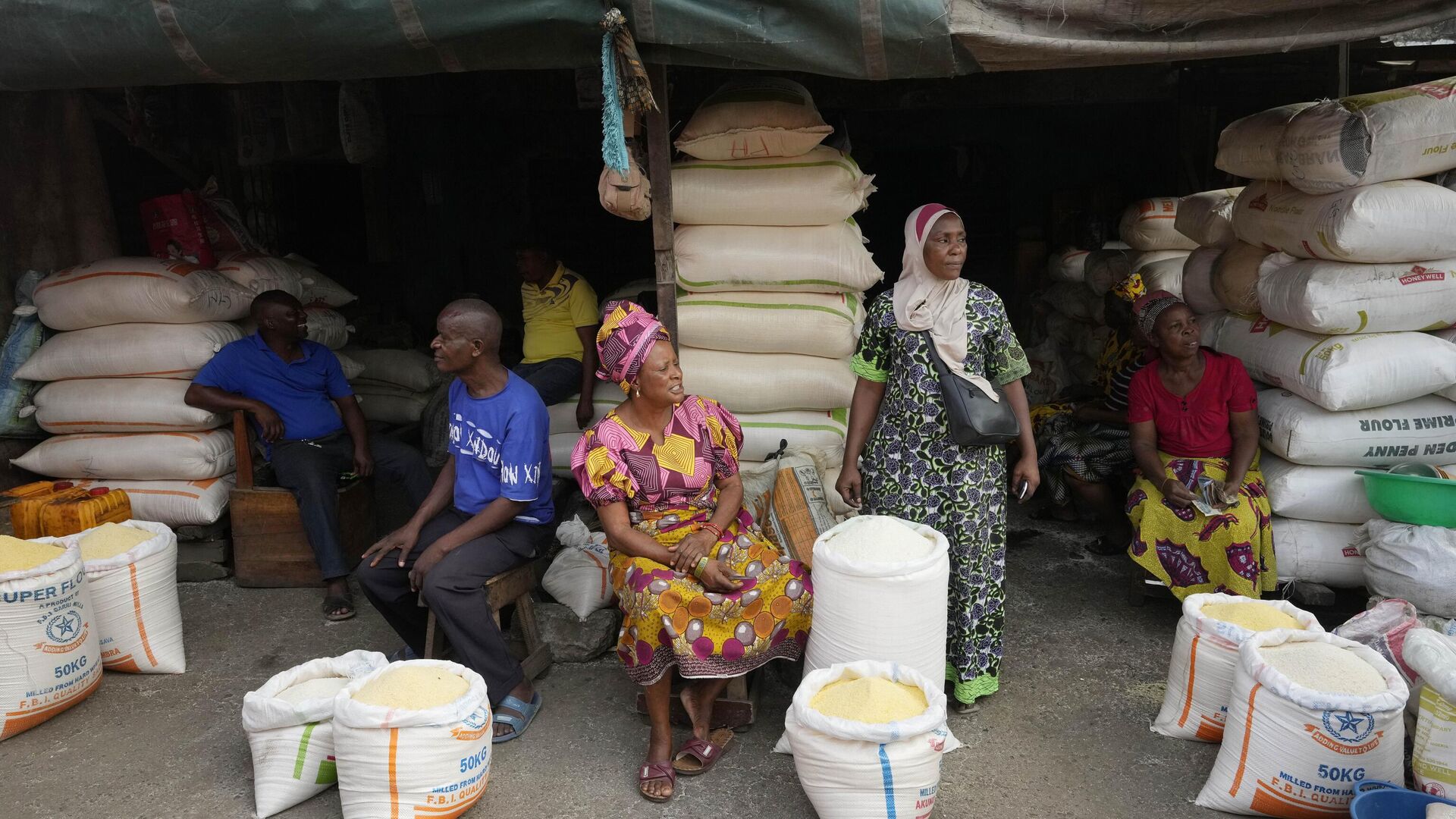https://sputnikglobe.com/20230304/multinational-companies-control-food-supply-in-africa--benefit-from-increasing-prices-report-says-1108020574.html
Multinational Companies Control Food Supply in Africa & Benefit From Increasing Prices, Report Says
Multinational Companies Control Food Supply in Africa & Benefit From Increasing Prices, Report Says
Sputnik International
Food prices in several African countries have surged to unprecedented levels that is mainly attributed to a lack of transparent information from food companies that monopolized the market and forced imports on Africans
2023-03-04T16:27+0000
2023-03-04T16:27+0000
2023-03-04T16:27+0000
africa
food security
food crisis
kenya
food shortages
multinationals
big corporations
greenpeace
https://cdn1.img.sputnikglobe.com/img/07e7/03/04/1108020715_0:160:3073:1888_1920x0_80_0_0_17f81511947cf4845b18e67964c74863.jpg
In recent years, food prices in several African countries have surged to unprecedented levels, mainly attributed to a lack of transparent information from food companies that have monopolized the market and forced imports on Africans, a report by Greenpeace has revealed. According to a report titled "Food Injustice 2020–2022," published this week, many people across the globe, in particular in Africa, "remain structurally vulnerable" in terms of food security. In Kenya, food prices skyrocketed by over 650% from 2008 to 2022. Greenpeace stated that this is a direct result of the global food system pushing African countries to import food, even though they could instead produce and benefit from a higher proportion of their own food.The report revealed that a group of multinational agribusiness corporations in the grain, fertilizer, meat, and dairy sectors control the food chain and "use their power to deliver outrageous profits to their shareholders while millions starve."It was noted that in the last two years, two severe crises, the COVID-19 pandemic and the military conflict in Ukraine, have disrupted global food supply chains and caused food shortages in many parts of the world. However, it was underlined that during the period when many nations were facing food insecurity in 2020 and 2021, 20 multinational food corporations that were covered by the research and represent only a slice of the market, gave $53.5 billion to their shareholders. The report further added that their profits are still on the rise. Meanwhile, in December last year, the UN estimated that a record $51.5 billion is needed to help 230 million of the world’s most vulnerable people in nearly 70 countries in 2023. The research compared these two figures, reaching the conclusion that the amount of money delivered to the shareholders of food firms "is more than enough to fund the basic needs" of the most vulnerable. It was noted that one of the key reasons for speculation and rising food prices is the lack of clear information from food corporations about the food system and supply chains. The companies "have disproportionate control, not only over the supply chains," but also over information about them. They withhold information that would contribute to a stabilization of prices, if it were published "with full transparency," the research highlighted. The report underscored that the current "vulnerable system" must be changed, and that this could be achieved by "bringing about food sovereignty," which would mean the creation of a more socially just and ecological food system. In this regard, Greenpeace urged policymakers to empower consumers and producers of food. It also called on governments to introduce measures to cut the power of the food firms that dominate the system.
https://sputnikglobe.com/20230120/how-west-used-global-food-crisis-to-whip-up-profits-seize-russias-niche-in-market-1106535089.html
africa
kenya
Sputnik International
feedback@sputniknews.com
+74956456601
MIA „Rossiya Segodnya“
2023
News
en_EN
Sputnik International
feedback@sputniknews.com
+74956456601
MIA „Rossiya Segodnya“
Sputnik International
feedback@sputniknews.com
+74956456601
MIA „Rossiya Segodnya“
africa, food crisis, food supply, greenpeace, food chains, multinational food corporations, food imports, agriculture
africa, food crisis, food supply, greenpeace, food chains, multinational food corporations, food imports, agriculture
Multinational Companies Control Food Supply in Africa & Benefit From Increasing Prices, Report Says
According to the World Health Organization, the Horn of Africa is now experiencing the most "catastrophic" food insecurity in decades, with over 37 million people facing acute hunger, while around seven million children under the age of five are acutely malnourished in the region.
In recent years, food prices in several African countries have surged to unprecedented levels, mainly attributed to a lack of transparent information from food companies that have monopolized the market and forced imports on Africans,
a report by Greenpeace has revealed.
According to a report titled "Food Injustice 2020–2022," published this week, many people across the globe, in particular in Africa, "remain structurally vulnerable" in terms of food security. In Kenya,
food prices skyrocketed by over 650% from 2008 to 2022.
Greenpeace stated that this is a direct result of the global food system pushing African countries to import food, even though they could instead produce and benefit from a higher proportion of their own food.
The report revealed that a group of multinational agribusiness corporations in the grain, fertilizer, meat, and dairy sectors control the food chain and "use their power to deliver outrageous profits to their shareholders while millions starve."
"The supply chains which deliver food are increasingly controlled by a small number of large corporations. The outsized influence these companies wield make the system more vulnerable to shocks which can disrupt essential processes, breaking the chain and pushing people into hunger," the report read.
It was noted that in the last two years, two severe crises, the COVID-19 pandemic and the military conflict in Ukraine, have disrupted global food supply chains and caused food shortages in many parts of the world.
However, it was underlined that during the period when many nations were facing food insecurity in 2020 and 2021, 20 multinational food corporations that were covered by the research and represent only a slice of the market, gave $53.5 billion to their shareholders. The report further added that their profits are still on the rise.
Meanwhile, in December last year,
the UN estimated that a record $51.5 billion is needed to help 230 million of the world’s most vulnerable people in nearly 70 countries in 2023. The research compared these two figures, reaching the conclusion that the amount of money delivered to the shareholders of food firms "is more than enough to fund the basic needs" of the most vulnerable.

20 January 2023, 18:10 GMT
It was noted that one of the key reasons for speculation and rising food prices is the lack of clear information from food corporations about the food system and supply chains. The companies "have disproportionate control, not only over the supply chains," but also over information about them. They withhold information that would contribute to a stabilization of prices, if it were published "with full transparency," the research highlighted.
"This is the new colonialism. Africa’s governments have allowed the ultra-rich of the US and Europe to retain too much power over Africans and our food system. They constructed a system that would be vulnerable to shocks [...]. It’s because of them that war and plague lead to famine – and to the rich getting richer," said Greenpeace Africa’s communication and story manager, Hellen Dena.
The report underscored that the current "vulnerable system" must be changed, and that this could be achieved by "bringing about food sovereignty," which would mean the creation of a more socially just and ecological food system. In this regard, Greenpeace urged policymakers to empower consumers and producers of food. It also called on governments to introduce measures to cut the power of the food firms that dominate the system.



